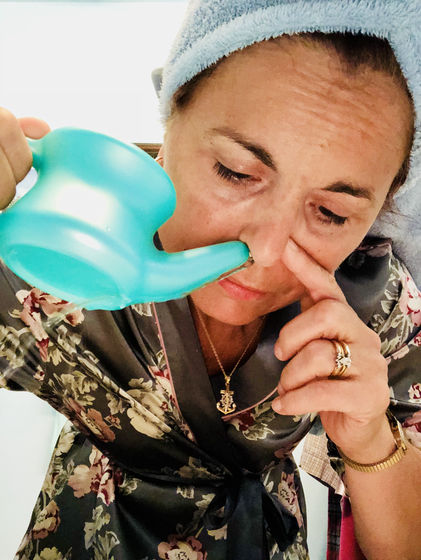Nasal irrigation helps prevent colds and allergies and the spread of viral infections

Viral upper respiratory tract infections, commonly known as colds, are a disease that everyone can suffer from, with the average person experiencing them three times a year, with symptoms lasting an average of nine days. Antibiotics are ineffective against colds, and most over-the-counter medications are only marginally effective. Research has shown that
Recent studies prove the ancient practice of nasal irrigation is effective at fighting the common cold
https://theconversation.com/recent-studies-prove-the-ancient-practice-of-nasal-irrigation-is-effective-at-fighting-the-common-cold-266659

Nasal irrigation (nasal irrigation) is the practice of irrigating the nasal passages with saline solution. It has been suggested that nasal irrigation may not only shorten the duration of illness, but also reduce viral transmission to others, minimize the need for antibiotics, and reduce the patient's risk of hospitalization. Nasal irrigation is also inexpensive and does not require a prescription.
'As a family physician, I see cold patients every day,' says Mary J. Skorbutakos, M.D., an adjunct assistant professor at Old Dominion University School of Medicine and a practicing physician. 'When I first recommend saline nasal rinses, patients are often skeptical. However, several have told me that this treatment has changed their lives. It not only treats upper respiratory infections, but also helps manage allergies, chronic nasal congestion, postnasal drip , and recurrent sinusitis.'
Nasal irrigation originates from Ayurveda , a traditional Indian medicine that has been around for over 5,000 years.
In studies examining the effectiveness of nasal rinses, some studies have used pump bottles while others have used traditional netipods .
The history of the netipod dates back to the 15th century, and it gained a lot of attention in the United States when a nasal irrigation using a netipod was demonstrated on the Oprah Winfrey Show in 2012. However, it has been confirmed that nasal irrigation devices existed not only in India but also in ancient Greece and Rome, and nasal irrigation was even featured in the 1902 issue of the medical journal, The Lancet .

Saline has several important benefits. First, it physically flushes out waste products from the nasal passages, including not only mucus and debris, but also viruses themselves, allergens, and other environmental pollutants.
Saline water also has a slightly lower pH than freshwater, which makes it more difficult for viruses to multiply and live in a less hospitable environment.
Additionally, saline helps restore part of your natural defense system, which consists of tiny hair-like projections called cilia that line the nasal passages. These cilia work in concert, acting like an escalator to expel viruses and other foreign particles from the body. Nasal rinsing with saline helps this system function effectively.

A 2024 study of over 11,000 people published in The Lancet showed that nasal saline rinses performed up to six times a day at the first sign of any infection or symptoms could reduce the duration of symptoms by an average of two days.
Smaller studies have shown that nasal irrigation can shorten the duration of illness by up to 4 days.
Nasal irrigation has also been shown to help prevent the spread of infection: In a study of hospitalized patients, nasal irrigation every four hours for 16 hours after infection with COVID-19 reduced the amount of COVID-19 virus by 8.9%. In contrast, the control group, which did not irrigate their noses, continued to experience an increase in viral load 16 hours after infection.
Regular nasal irrigation has been shown to reduce the amount of anti-allergy medication used by 62% in patients with allergic rhinitis (hay fever), and has also been shown to be effective in treating chronic nasal congestion, postnasal drip, and recurrent sinus infections.
Nasal rinses not only help patients feel better faster, but they can also reduce unnecessary antibiotic prescriptions, a leading cause of antibiotic resistance. It's no secret that antibiotics don't shorten the duration or severity of respiratory infections. However, research shows that patients feel happier when they leave the office with an antibiotic prescription.
Additionally, a study of more than 49,000 patients with respiratory infections found that 42.2% of patients were prescribed antibiotics unnecessarily.
One of the reasons why antibiotics tend to improve symptoms early in upper respiratory viral infections is due to their off-target anti-inflammatory effects, but this effect is enhanced when combined with anti-inflammatory drugs such as ibuprofen or naproxen, which can be used in conjunction with saline nasal irrigation.
Therefore, Skorbutakos said, 'Nasal irrigation is an inexpensive, effective, evidence-based alternative that not only shortens the duration of illness, but also prevents the spread of disease, minimizes the need for unnecessary antibiotics, and keeps people out of the hospital.'
The nasal irrigator used by the editor-in-chief of GIGAZINE is as follows.
Amazon.co.jp: Hanaclean α Nasal Wash, 300ml Container, Pump Type, Painless, Daily Nasal Cleansing, High Cleansing Power, Includes 30 Uses of Sale MP Cleanser, Made in Japan, Tokyo Rhinology Laboratory: Drugstore

Related Posts:
in Science, Posted by logu_ii







